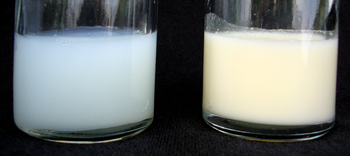
Back حليب الثدي Arabic Lleche materno AST Ana südü Azerbaijani Жаночае малако Byelorussian Жаночае малако BE-X-OLD Кърма Bulgarian বুকের দুধ Bengali/Bangla Llet materna Catalan Mateřské mléko Czech Llaeth y fron Welsh

Breast milk (sometimes spelled as breastmilk) or mother's milk is milk produced by the mammary glands in the breast of human females. Breast milk is the primary source of nutrition for newborn infants, comprising fats, proteins, carbohydrates, and a varying composition of minerals and vitamins. Breast milk also contains substances that help protect an infant against infection and inflammation, such as symbiotic bacteria and other microorganisms and immunoglobulin A, whilst also contributing to the healthy development of the infant's immune system and gut microbiome.[1]
- ^ Association, Australian Breastfeeding (2017-07-03). "Breastmilk composition". Australian Breastfeeding Association. Retrieved 2021-01-29.
© MMXXIII Rich X Search. We shall prevail. All rights reserved. Rich X Search